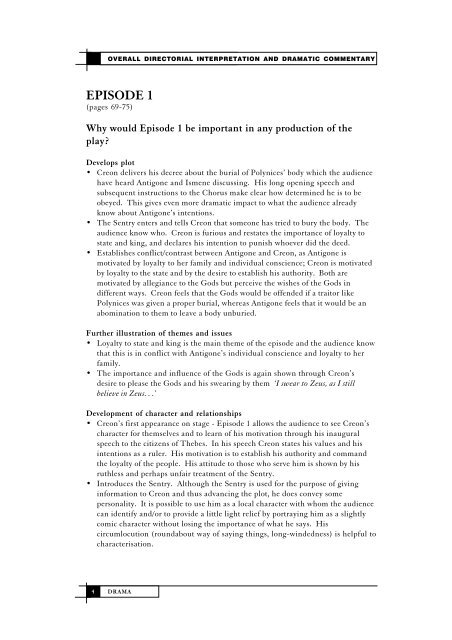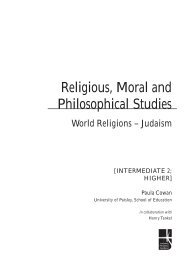PDF file: Drama - Higher - Antigone - Education Scotland
PDF file: Drama - Higher - Antigone - Education Scotland
PDF file: Drama - Higher - Antigone - Education Scotland
Create successful ePaper yourself
Turn your PDF publications into a flip-book with our unique Google optimized e-Paper software.
4<br />
OVERALL DIRECTORIAL INTERPRETATION AND DRAMATIC COMMENTARY<br />
EPISODE 1<br />
(pages 69-75)<br />
Why would Episode 1 be important in any production of the<br />
play?<br />
Develops plot<br />
• Creon delivers his decree about the burial of Polynices’ body which the audience<br />
have heard <strong>Antigone</strong> and Ismene discussing. His long opening speech and<br />
subsequent instructions to the Chorus make clear how determined he is to be<br />
obeyed. This gives even more dramatic impact to what the audience already<br />
know about <strong>Antigone</strong>’s intentions.<br />
• The Sentry enters and tells Creon that someone has tried to bury the body. The<br />
audience know who. Creon is furious and restates the importance of loyalty to<br />
state and king, and declares his intention to punish whoever did the deed.<br />
• Establishes conflict/contrast between <strong>Antigone</strong> and Creon, as <strong>Antigone</strong> is<br />
motivated by loyalty to her family and individual conscience; Creon is motivated<br />
by loyalty to the state and by the desire to establish his authority. Both are<br />
motivated by allegiance to the Gods but perceive the wishes of the Gods in<br />
different ways. Creon feels that the Gods would be offended if a traitor like<br />
Polynices was given a proper burial, whereas <strong>Antigone</strong> feels that it would be an<br />
abomination to them to leave a body unburied.<br />
Further illustration of themes and issues<br />
• Loyalty to state and king is the main theme of the episode and the audience know<br />
that this is in conflict with <strong>Antigone</strong>’s individual conscience and loyalty to her<br />
family.<br />
• The importance and influence of the Gods is again shown through Creon’s<br />
desire to please the Gods and his swearing by them ‘I swear to Zeus, as I still<br />
believe in Zeus. . .’<br />
Development of character and relationships<br />
• Creon’s first appearance on stage - Episode 1 allows the audience to see Creon’s<br />
character for themselves and to learn of his motivation through his inaugural<br />
speech to the citizens of Thebes. In his speech Creon states his values and his<br />
intentions as a ruler. His motivation is to establish his authority and command<br />
the loyalty of the people. His attitude to those who serve him is shown by his<br />
ruthless and perhaps unfair treatment of the Sentry.<br />
• Introduces the Sentry. Although the Sentry is used for the purpose of giving<br />
information to Creon and thus advancing the plot, he does convey some<br />
personality. It is possible to use him as a local character with whom the audience<br />
can identify and/or to provide a little light relief by portraying him as a slightly<br />
comic character without losing the importance of what he says. His<br />
circumlocution (roundabout way of saying things, long-windedness) is helpful to<br />
characterisation.<br />
DRAMA
















